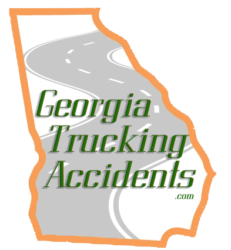Georgia 18-Wheeler Accident Attorneys, Lawsuits and Settlements
Stopping 18 wheels takes a long distance in perfect environmental and atmospheric conditions. Add some precipitation, wind, or fog, and the 18-wheeler’s stopping distance increases dramatically. Not only does the truck driver need to stop his tractor, but the driver must also stop the trailer. A mechanical failure, a slow reaction, or over-reaction because of inattentiveness by the driver and the 18-wheeler could jackknife, rollover, skid, or not stop until it slams into another object. If that object is a passenger car, sports utility vehicle, or pickup truck, the results could be devastating.
According to the Georgia Department of Driver Services (GDDS) as well as the Federal Motor Carrier Safety Administration (FMCSA), inattentiveness is one of the primary causes of 18-wheeler accidents, so too are a failure to judge distances and speed properly as well as speeding. GDDS recommends that 18-wheeler drivers look ahead 12 to 15 seconds down the road. Good, attentive drivers will shift their attention back and forth between objects that are in their immediate view and the things they will encounter in the next quarter of a minute. Not looking far enough ahead and anticipating another driver’s maneuver will limit the amount of reaction time the driver has to respond. Having insufficient time means that the driver will have to brake hard or aggressively change lanes. Doing so creates a hazardous situation. Fast and uncontrolled movements by the driver can cause the truck to jackknife, skid, or rollover.
Fatigue is one of the most frequently cited causes of 18-wheeler accidents. Drivers must scrupulously follow the federal regulations for hours on duty. Refusing to follow those rules can make a driver tired. Tired drivers lose focus on the road, become easily distracted, feel their judgment is impaired, and their reaction time slowed.
Falling asleep at the wheel is the worst case scenario for a fatigued 18-wheel driver. Physically nodding off means that the 18-wheeler is operating on its own and will go where ever the wheels are pointing. A driver may not regain his or her senses until the first contact with an object. Upon waking, the driver might take aggressive evasive action by jerking the wheel and over-correcting. Pulling the wheel will throw the delicate balance of the truck off and cause it to rollover or jackknife. If a truck jackknifes too close to oncoming motorists, there is a risk that the oncoming motorist will not have sufficient time to react, creating the threat of underriding the trailer.
If you or a loved one was a victim of an 18-wheeler accident in Georgia, you could be eligible to recover damages for your loss. A person injured or the family of a person killed in an 18-wheeler crash in Georgia may recover compensation for:
- Present and future medical bills,
- Lost wages and loss of earning potential,
- Pain and suffering,
- Damages for an amputation or severe permanent injury, and
- the value of the whole life of the person killed in the crash including compensation for medical bills, funeral costs, and burial costs.
The driver of an 18-wheeler that caused a wreck may be solely responsible for your loss. However, Montlick & Associates believe in thoroughly investigating every avenue of recovery and will examine whether the trucking company or a manufacturer could also be liable for damages in your 18-wheeler accident.
Put Our Law Firm’s Over 33 Years Of Legal Experience To Work For Your Case!
The time you have to legally receive compensation is limited.
Sources:
http://www.eregulations.com/wp-content/uploads/2017/06/17GACM.pdf
https://www.ntsb.gov/safety/Documents/SafetyTips_FleetOwners.pdf

